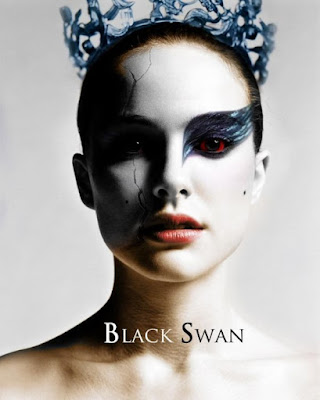PSYCHOLOGY OF THE MOVIE "BLACK SWAN"
Black Swan, directed by Darren Aronofsky is a psychological horror film based on an original story by Heinz, where Nina (played by Natalie Portman), a ballerina who is passionate for dance, gets a chance to play the White Swan. While Nina is the first choice for the role, the company's artistic director decides that Lily (played by Mila Kunis), a newcomer, might fit the role better for the opening production of "Swan Lake". The rivalry between the two turns into a twisted friendship and Nina's dark side begins to emerge.
[Synopsis of the ballet: The Black Swan seduces White Swan's lover, then the White Swan jumps to her death.]
- From Nina's many anxieties and disorders, she has Obsessive Compulsive Disorder. She has skin picking (compulsion to pick your skin), which is also included in the category of OCD.
- It is clear she has eating disorders, as she is often seen getting anxious about eating, which to me, makes her anorexic as well. Including this, Nina's character highlights all major issues one might have to face in the dance industry, as the industry focuses on the appearance and perfectionism way too much other than just dancing.
- Nina is also very much obsessed with being perfect. For instance, dancing until the point of exhaustion. Also, the first time she played the Black Swan, her toe nails began to bleed. She tried to play the Black Swan so perfectly she began to lose her own self. We see Nina becoming a Swan, this might be a symbol for Method Acting. She wants to be so perfect that she wants to live the character in order to which she becomes the character.
- Nina also has Body Dis-morphia as she is extremely preoccupied with a perceived flaw in her appearance. In Nina's case, I think it is too extreme that she is not even herself sometimes. She sometimes sees herself in other forms and shapes, which also indicates Dissociative Identity Disorder. Though, she does not have multiple personalities, but she finds it hard to integrate between two of her personalities (White Swan - pure and sweet, and the Black Swan - revengeful and bad). She is either one or the other and can't really put the two together. Actually, Nina's character is pretty childlike, almost like a repressed and a shy child. This can be observed from how she speaks, her room and her relationship with her mother. When she is playing the White Swan, she finds it difficult to play the Black Swan, because she can't find a balance between being innocent and being bad.
- Nina is also seen to have hallucinations. As she sees herself in other forms sometimes, and also has paranoia as she keeps thinking that Lily is after her, even though she really isn't. Her psychosis is also triggered when she takes ecstasy. Psychosis is basically when your mental condition is so extreme that you lose touch from the reality. In a few scenarios, we see that Nina's reflections does not seem to move along, which symbolizes her Psychosis.
- I do not think Nina's mother is aware of her anxiety disorder and eating disorder. As when she asks Nina to eat the cake, Nina refuses and her mother throws the cake into the trash, which does not show an understandable behavior. She sleeps with Nina in the same room and also sometimes enters the bathroom just to ask Nina if she is okay. This portrays her as an overbearing parent.
- Lily is open, carefree, impulsive and risk-taking. I don't think she was ever after Nina, but actually wanted to "corrupt" the repressed Nina. Plus, she has a tattoo of a black wing on her back, which is a clear symbol that she personifies the Black Swan.
- During Nina and Lily's love scene, Lily's face turns into Nina's face at the end, and the girl then kills Nina. This explains how Lily tried to kill the sweet and innocent version of Nina, which is also the death of the White Swan.
- In the end of the film, we see Nina playing the Black Swan flawlessly. She could not do the Black Swan any better than the White Swan in the beginning, but she does so in her performance at the end. Though, she becomes perfect in the end, she had to sacrifice her life, which explains you can only be perfect enough if you sacrifice everything and how harmful it can be.






If perfect would be the thing then we should have been robots. Love exist in imperfection 💗🙌🏼
ReplyDelete👏👏👏
ReplyDelete👍👏👏
ReplyDeleteWoah !! 💗💗 Keep going 💜
ReplyDelete😊🥰👍👌👏👏👏
ReplyDelete